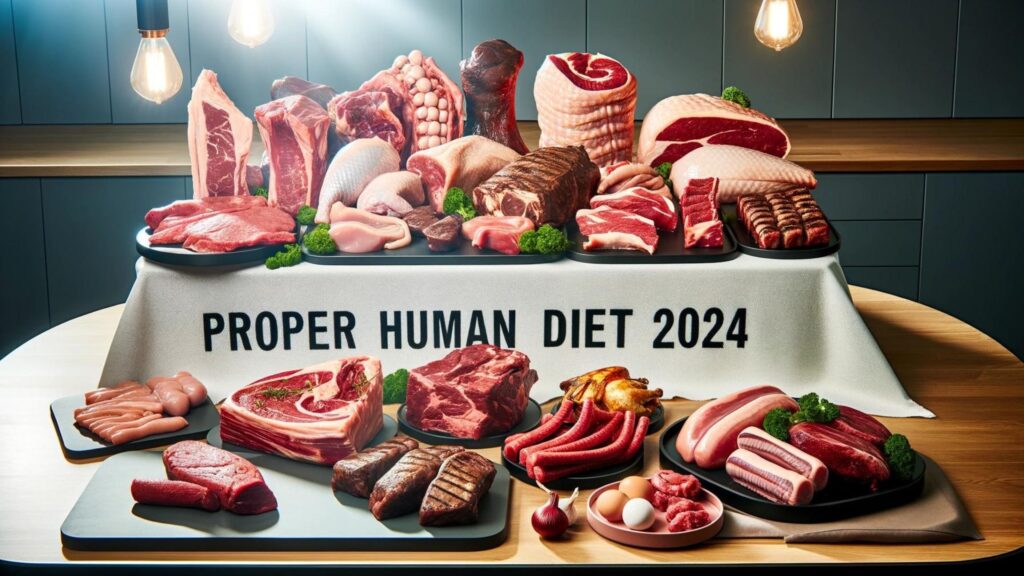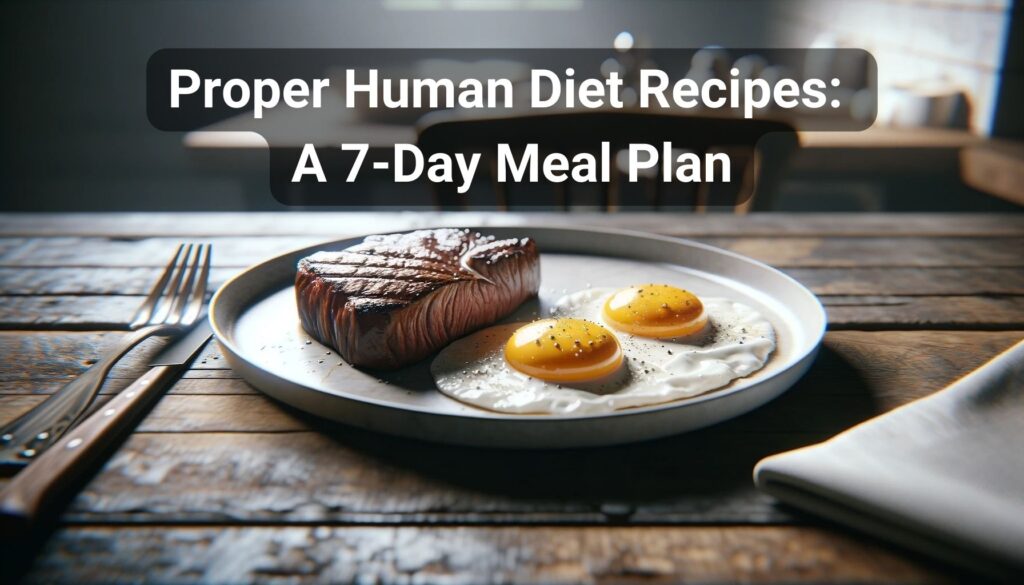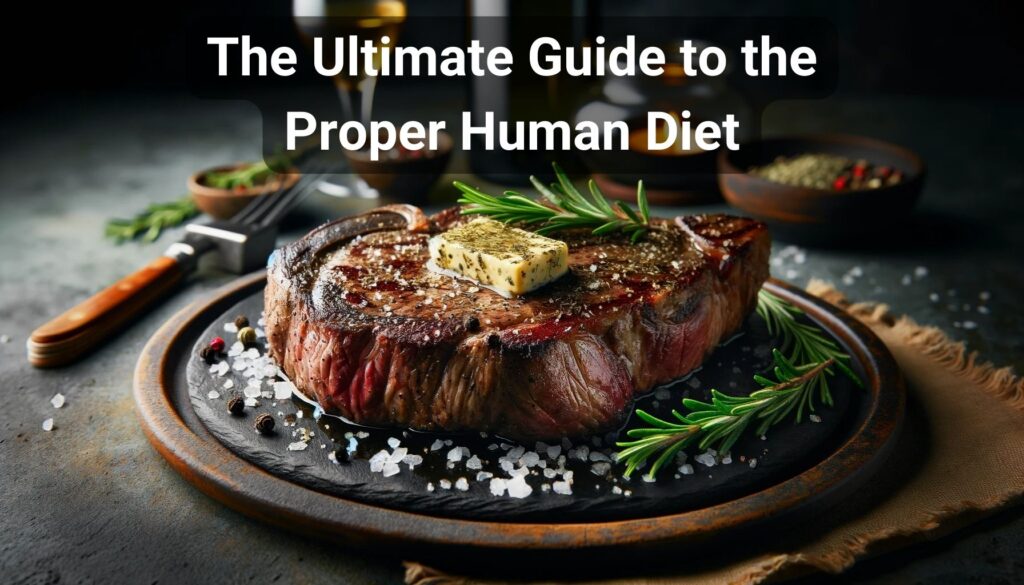Have you ever wondered if ditching the veg and going all-in on meat might just be your ticket to health? Dr. Ken Berry’s take on the Carnivore Diet is turning heads and challenging age-old nutrition myths. Let’s dive into the meat of the matter and see if this diet is a prime cut or just another fad.
Debunking Myths and Understanding the Carnivore Diet according to Dr Berry
Introduction
The Carnivore Diet, or the proper human diet, advocated by Dr. Ken Berry, has sparked significant debate in nutritional circles. Proponents laud its benefits, while skeptics raise concerns about its long-term viability and health implications. This article delves into the arguments against the Carnivore Diet, presenting Dr. Berry’s responses in a rapid-fire discussion format. Our aim is to provide a clear, balanced view of this controversial diet.
For a beginner-friendly introduction to the principles of a proper human diet, be sure to check out our comprehensive guide at Proper Human Diet: A Beginner’s Guide.

The Joy of Eating: Restriction vs. Nutrition
The Argument: The Carnivore Diet is too restrictive. Life is too short to give up pleasures like ice cream and social outings.
Dr. Berry’s Response: Dr. Berry challenges this viewpoint by emphasizing the distinction between eating for pleasure and eating for nutrition. He argues that deriving most of one’s joy from food might indicate an unbalanced lifestyle. Instead, he advocates for a focus on nutrition, treating food as a source of nourishment rather than the primary source of happiness.
Analysis: This perspective invites us to reconsider our relationship with food. It raises the question: should food be a source of entertainment or a means to fuel our bodies? Dr. Berry’s approach suggests a paradigm shift, viewing food as a tool for health rather than a source of amusement.
The Myth of High-Carb, Low-Fat Diets
The Argument: There’s a conspiracy theory suggesting that traditional dietary advice (high-carb, low-fat) is misleading.
Dr. Berry’s Response: Dr. Berry denies the existence of a conspiracy but acknowledges “perverse incentives” in the food industry. These incentives, he argues, lead to the promotion of high-carb, high-sugar foods with long shelf lives. He attributes the current metabolic health crisis to these dietary trends, suggesting greed, incompetence, and ignorance as culprits rather than a deliberate conspiracy.
Analysis: This statement sheds light on the complexities of food industry economics and public health messages. It suggests that the rise in metabolic illnesses could be a byproduct of misguided nutritional advice influenced by market forces rather than science.
Discover the 20 essential principles shaping a proper human diet in 2024 by visiting our detailed article here.
The Saturated Fat Controversy
The Argument: The high saturated fat content in the Carnivore Diet raises concerns about heart disease and cholesterol.
Dr. Berry’s Response: Dr. Berry refutes this claim by highlighting the lack of scientific evidence linking red meat consumption to heart disease or cancer. He compares the consumption of red meat to fundamental human needs like breathing air and drinking water, stressing the naturalness of meat in the human diet.
Analysis: This point challenges widely held beliefs about saturated fat and heart health. By framing red meat consumption as a natural part of human history, Dr. Berry invites a reevaluation of current dietary guidelines that vilify saturated fats.

Affordability of the Carnivore Diet
The Argument: The Carnivore Diet is perceived as expensive and seemingly accessible only to the wealthy.
Dr. Berry’s Response: Dr. Berry argues that the diet can be affordable by choosing less expensive meat cuts like ground beef, hot dogs, bologna, and sardines. He also notes that many on the Carnivore Diet find themselves eating fewer meals and snacks, which can lead to overall savings on food expenses.
Analysis: This perspective challenges the notion that a meat-based diet is inherently costly. By suggesting economical ways to follow the Carnivore Diet, Dr. Berry makes it more accessible to a wider audience.
The Fiber Fallacy
The Argument: A common belief is that a lack of fiber, as in the Carnivore Diet, leads to constipation and digestive issues.
Dr. Berry’s Response: Dr. Berry debunks this myth, asserting that there is no physiological requirement for fiber in the diet. He notes that many people following a carnivore lifestyle report fewer digestive problems compared to those on high-carb, high-fiber diets.
Analysis: This counterintuitive stance invites a reexamination of the role of fiber in digestive health. Dr. Berry’s observations suggest that the human digestive system may be more adaptable to different diets than commonly believed.

Conclusion
In this first part of our analysis, we’ve explored Dr. Ken Berry’s responses to common criticisms of the Carnivore Diet. From the role of food in our lives to misconceptions about fat and fiber, these discussions challenge traditional dietary beliefs. In the next part, we will delve deeper into the nutritional science behind the Carnivore Diet and its implications for long-term health.
For an in-depth understanding of Dr. Ken Berry’s approach to nutrition, explore our article on the Proper Human Diet as explained by Dr. Berry.
Exploring the Science and Sustainability of the Carnivore Diet

Nutritional Science Behind Carnivore Diet
The Carnivore Diet, consisting solely of animal products, is often criticized for its apparent lack of dietary variety. However, proponents like Dr. Berry argue that this diet provides all essential nutrients in bioavailable forms. Let’s break down the key nutritional aspects:
- Protein: Animal products are complete sources of protein, containing all essential amino acids.
- Fat: Saturated and monounsaturated fats from animal sources are argued to be healthy and necessary for various bodily functions.
- Vitamins and Minerals: Meat, especially organ meats, are rich in essential vitamins (like B12 and D) and minerals (like iron and zinc), often more so than plant-based sources.
Analysis: The nutritional profile of the Carnivore Diet challenges the conventional dietary pyramid. Providing a high intake of protein, fats, and essential micronutrients, it poses a counter-narrative to the standard high-carb, low-fat diet advice.

Long-Term Sustainability and Health Impacts
The Concern: Critics often question the long-term sustainability and potential health risks of an all-meat diet.
Dr. Berry’s Perspective: He argues that humans have historically thrived on meat-based diets and that the modern prevalence of chronic diseases correlates more with processed and carb-heavy diets.
Analysis: This perspective warrants a broader examination of historical dietary patterns and their health outcomes. While the short-term benefits of the Carnivore Diet are reported by many, long-term studies are needed to fully understand its impact.
Environmental and Ethical Considerations
A discussion on the Carnivore Diet isn’t complete without addressing its environmental and ethical implications.
- Environmental Impact: Critics argue that meat production is resource-intensive and harmful to the environment. Proponents counter this by advocating for sustainable farming practices.
- Ethical Concerns: Animal welfare is a significant concern. Ethical carnivores often emphasize the importance of sourcing from humane, ethical farms.
Analysis: These considerations add complexity to the diet’s feasibility. Balancing nutritional benefits with environmental and ethical responsibilities is a challenge that followers of the diet must navigate.

Adapting to the Carnivore Lifestyle
Adopting the Carnivore Diet is not just about changing what one eats but also about adapting to a new lifestyle. This includes:
- Overcoming Social Challenges: Navigating social situations and dining out can be challenging.
- Listening to the Body: It requires a keen awareness of how one’s body reacts to different foods.
- Mental Shift: Embracing this diet often involves a mental shift in how one views food and nutrition.
Analysis: Transitioning to a Carnivore Diet involves significant lifestyle changes. It’s not just a dietary choice but also a social and psychological shift.
Dive into delicious, health-focused eating with our 7-day meal plan featuring Proper Human Diet Recipes.
Conclusion
In this second part of our article, we’ve explored the scientific underpinnings, sustainability, and lifestyle implications of the Carnivore Diet. While this diet presents a radical departure from conventional dietary guidelines, it raises important questions about nutrition, health, and our relationship with food.
Dr. Ken Berry’s responses to common criticisms offer a perspective that challenges mainstream dietary advice. However, as with any diet, it’s crucial to consider individual health needs and consult healthcare professionals before making significant dietary changes.
We’ve delved into Dr. Ken Berry’s viewpoints, analyzed the diet from various angles, and explored its broader implications. I hope this has provided a comprehensive and engaging understanding of the subject.
Reference:
This article’s information is based on Dr. Ken Berry’s insights, as featured in the video available at: https://youtu.be/B_aICEgkHHg?si=PTc-nLOp70QcKJUf.


